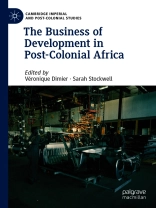This collection brings together a range of case studies by both established and early career scholars to consider the nexus between business and development in post-colonial Africa. A number of contributors examine the involvement of European companies (most notably those of former colonial powers) in development in various African states at the end of empire and in the early post-colonial era. They explore how businesses were not just challenged by the new international landscape but benefited from the opportunities it offered, particularly those provided by development aid. Other contributors focus on the development agencies of the departing colonial powers to consider how far these served to promote the interests of European companies. Together these case studies constitute an important contribution to our understanding of both business and development in post-colonial Africa, redressing an imbalance in existing histories of both business and development whichfocus predominantly on the colonial period. This volume breaks new ground as one of the very first to bring the study of foreign companies and development aid into the same frame of analysis
Inhoudsopgave
1. Introduction: New Directions in the History of Business and Development in Post-Colonial Africa; Véronique Dimier and Sarah Stockwell.- 2. Business, the Commonwealth and the Rhetoric of Development: The Federation of Commonwealth Chambers of Commerce and Africa, 1945–1974; Andrew Dilley.- 3. Adapting to Independence: The East Africa Association, Post-Colonial Business Networks and Economic Development; Poppy Cullen.- 4. Belgian Firms, Development Plans and the Independence of the Belgian Congo; Charlotte Strick.- 5. Oil Companies as Agents of Post-Colonial Relations: France, Algeria, and Italy in the Sahara; Marta Musso.- 6. A Partner in Progress? Shell-BP’s Development Role in Nigeria During the Transition to Independence; Christopher Minton.- 7. The ‘Know-How of the World is Mainly with Private Companies’: The Commonwealth Development Corporation and British Business in Post-Colonial Africa; Sarah Stockwell.- 8. Decolonizing Finance, Africanizing Banking- François Pacquement.- 9. The European Development Fund, a Dowry for French Companies?-Véronique Dimier.- 10. Displacing the French? Ivorian Development and the Question of Economic Decolonisation, 1946–1975- Abou B. Bamba.-11. European Private Sector and African Firms in EU-ACP Development Cooperation (1975–2000)- Olivier Van den Bossche.- 12. Afterword- Véronique Dimier and Sarah Stockwell.
Over de auteur
Véronique Dimier is Professor at the Free University of Brussels, Belgium. She held the Chaire Gutenberg in 2015 at SAGE, the Research Centre on Society, Stakeholders and Government in Europe, at the University of Strasbourg. She has worked extensively on French and British colonial administrations and on the second career of French colonial officials, most notably in the development field. She is the author of
Le
Gouvernement des Colonies, Regards Croisés Franco-Britanniques (2004), and
The Invention of a European Development Bureaucracy: Recycling Empire (2014).
Sarah Stockwell is Professor of Imperial and Commonwealth History at King’s College London, UK. Her research focuses on the history of British decolonisation, especially in Africa. Her publications include
The Business of Decolonization. British Business Strategies in the Gold Coast (2000),
The British End of the British Empire (2018), and, as editor,
The British Empire. Themes and Perspectives (2007) and, with L.J. Butler,
The Wind of Change: Harold Macmillan and British Decolonization (2013).












